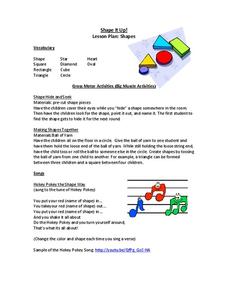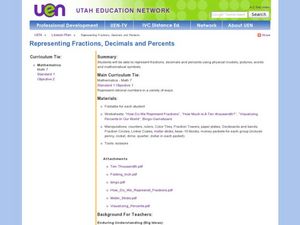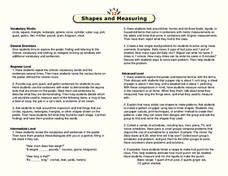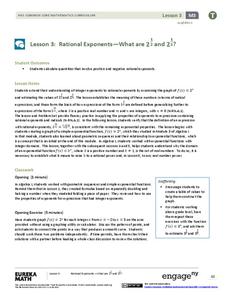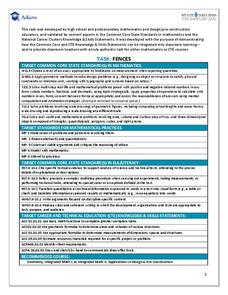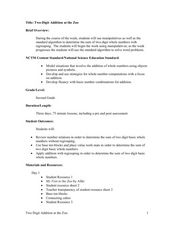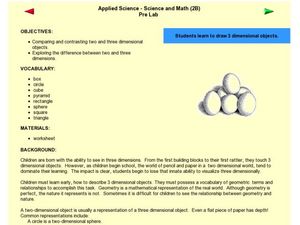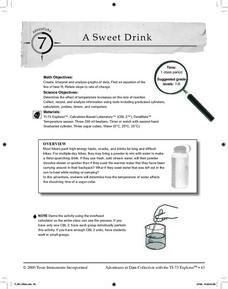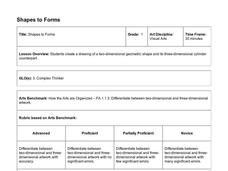Early Childhood Education
Shape It Up!
The best way to understand shapes is to make them. Young geometers explore basic shapes through a variety of gross motor and fine motor activities. Shape sorting, singing songs about shapes, and eating shape snacks are just a few of the...
Mathed Up!
Factors, Multiples, and Primes
Reinforce the concept of factors, multiples, and prime numbers with a 16-problem practice instructional activity. Eight pages offer a variety of problem solving opportunities with clear objectives and tips for successful completion.
Curated OER
Representing Fractions, Decimals, and Percents
In this fractions, decimals, and percents lessons, students explore various methods of representing fractions. They demonstrate situations that represent rational numbers. Students create a foldable exploring fractions, decimals and...
Houghton Mifflin Harcourt
Shapes and Measuring
Youngsters develop mathematical vocabulary with this worksheet. First, give youngsters time to identify their vocabulary words in the picture provided. Then, as a group, practice saying the vocabulary words aloud. Finally, have learners...
EngageNY
Rational Exponents—What are 2^1/2 and 2^1/3?
Are you rooting for your high schoolers to learn about rational exponents? In the third installment of a 35-part module, pupils first learn the meaning of 2^(1/n) by estimating values on the graph of y = 2^x and by using algebraic...
Achieve
Fences
Pupils design a fence for a backyard pool. Scholars develop a fence design based on given constraints, determine the amount of material they need, and calculate the cost of the project.
Curated OER
Two-Digit Addition at the Zoo
Your second graders explore two digit addition with regrouping. They will investigate problem solving strategies within the context of a trip to the zoo. Multiple resources and assessments are provided.
Curated OER
Games for Probability: In-Class and Powerball Simulation
Your soon-to-be statisticians play a game to understand the difference between independent and dependent experiments and probability. They draw colored cubes from a bag and then, by either replacing the cube in the bag, or not, for each...
Curated OER
Finding Volume
Sixth graders develop a rule for finding the volume of rectangular solids using colored cubes. They investigate the properties of solid figures and find the volume of an object by counting units. Students fill spaces with standard-sized...
Curated OER
Investigation Can You Build This?
Students work in small groups to explore spatial relationships while building with color cubes. Students must identify positions of blocks to partner, recreate a model, and color a sketch of their structure appropriately.
Curated OER
Hundreds and Tens - Count the Blocks & Rows
A perfect second grade worksheet. The class reviews counting by hundreds and tens using cubes, then count blocks and rows to determine how many cubes there are in a given set, 4 sets total.
Curated OER
Draw 3 Dimensional Objects
Bring three-dimensional shapes to life in your classroom. First introduce the vocabulary of three-dimensional shapes, such as sphere, cube, and pyramid. Then, show your kids examples of how to use two-dimensional objects draw...
Curated OER
Learning by Logic - Total Surface Area
Geometers calculate the area of plane surfaces using the formulas for the area of a square, rectangle, and triangle. They develop the formula for calculating the total surface area of two geometric solids: the cube and rectangular prism.
Curated OER
Linear Equations & Manipulatives
High schooler math students review operations and solve linear equations using manipulatives--squares, cubes, circles, and cups. They transfer the operations performed on the manipulatives in equation form.
Georgia Learning Connections
Stand By Me!
Get your little mathematicians moving with this experiential activity in which one child is the "tens" and another is the "ones." They collect the number of unifix cubes (in tens or singles) assigned to their respective place values and...
Curated OER
Teddy Bears and Friends
Children begin by making direct comparisons between objects and putting a number of objects into order according to length. They are also introduced to measuring with multi-link cubes which allows them to compare objects which cannot be...
Curated OER
Solving Fractions with Manipulatives
Students use candy bars, beef jerky, and brownies to represent different fractions. Students also use colored multi-link cubes or blocks to illustrate the same representations of fractions. Students work with a partner to create diagrams...
Curated OER
A Sweet Drink
Students investigate reaction rates. In this seventh or eighth grade mathematics lesson, students collect, record, and analyze data regarding how the temperature of water affects the dissolving time of a sugar cube. Studetns determin...
Curated OER
Comparing and Ordering Decimals - Complete Lesson Plan
Base ten blocks serve as visual representations of numbers that include decimals to the hundredths place. Children compare and order decimals in their math journal as they build the corresponding numbers with base ten blocks.
Curated OER
Cross Sections
Young visual learners explore different cross sections of 3-dimensional objects. First, cross sections of cubes are explored by using an interactive flash activity. This is then extended by looking at cross sections of spheres,...
Curated OER
Volume of a Rectangular Prism
Children use the length, width, and height of an object to calculate the volume of a rectangular prism. They observe how to multiply three numbers at a time, and define volume. Pupils observe as the teacher demonstrates how to determine...
Curated OER
Recording Repeating Pattern
Patterns are everywhere! The challenge here is to analyze, create and record repeating patterns. Young mathematicians create different patterns both on paper and using snap cubes.
Curated OER
Shapes to Forms
Here is a math lesson that is really a visual arts lesson in disguise! In it, pupils utilize their knowledge of geometric shapes and forms to create a detailed version of a cylinder. The instructions on how to go about the task are very...
Curated OER
Measurement
Students create two prisms out of the same paper. They calcuate the number of centimeter cubes needed to fill each prism. They discover the concept of volume.


